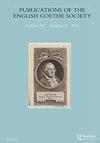十九世纪女性说书人的重新定位:劳拉·冈岑巴赫和卡门·西尔瓦作品中的适应与反抗策略
IF 0.1
3区 文学
0 LITERATURE, GERMAN, DUTCH, SCANDINAVIAN
引用次数: 0
摘要
本文探讨了19世纪的女童话作家和女童话收藏家如何将自己置身于不同的当代讲故事的女人的比喻中,以遵循她们自己的社会和政治议程。通过关注劳拉·冈岑巴赫(Sicilianische Märchen, 1870)和卡门·西尔瓦(Pelesch-Märchen, 1883)所写的童话故事,本文展示了这些作家是如何明显地适应和接受女性说书人的刻板印象的——尤其是女性被认为是童话故事的中介而不是编辑的角色,以及她们与自然的内在联系。然而,历史语境化和深入的文本分析揭示了这些作家如何利用这些比喻来遵循他们自己的议程,即:放大女性的声音和质疑性别类别(Gonzenbach),并声称通过与自然的联系而合法化的权力(Sylva)。本文章由计算机程序翻译,如有差异,请以英文原文为准。
Reclaiming the Female Storyteller in the Nineteenth Century: Strategies of Adaptation and Resistance in the Works of Laura Gonzenbach and Carmen Sylva
This article explores how women writers and collectors of fairy tales in the nineteenth century situated themselves within different contemporary tropes of the tale-telling woman in order to follow their own social and political agendas. By focussing on fairy tales written by Laura Gonzenbach (Sicilianische Märchen, 1870) and Carmen Sylva (Pelesch-Märchen, 1883), this paper shows how these writers apparently adapted to and embraced stereotypes of the female storyteller — particularly women’s alleged role as intermediaries, rather than editors, of fairy tales, and their supposed inherent connection to nature. However, historical contextualization as well as in-depth textual analyses expose how the writers in question instrumentalized these tropes in order to follow their own agendas, namely: amplifying women’s voices and questioning gender categories (Gonzenbach), and laying claim to power that is legitimized by a connection with nature (Sylva).
求助全文
通过发布文献求助,成功后即可免费获取论文全文。
去求助
来源期刊

Publications of the English Goethe Society
LITERATURE, GERMAN, DUTCH, SCANDINAVIAN-
CiteScore
0.10
自引率
0.00%
发文量
15
 求助内容:
求助内容: 应助结果提醒方式:
应助结果提醒方式:


